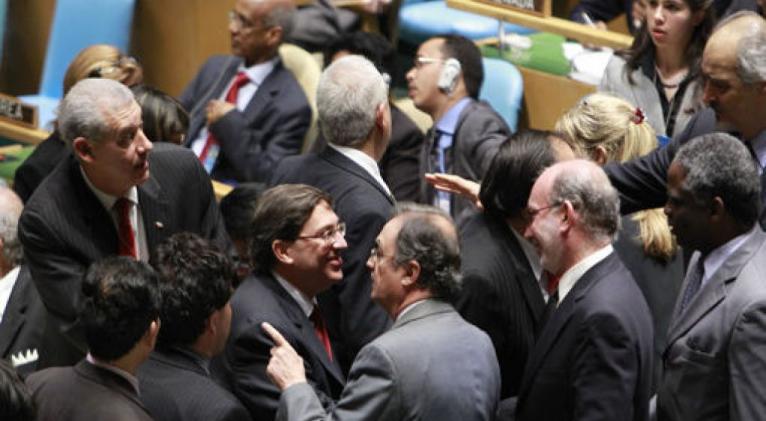New York Times calls for reset of U. S. agenda on Cuba

A series of New York Times editorials calling for new U.S. relations with Cuba is the signal for U.S. organizations and individuals involved with Cuba to launch a unified campaign.
On Dec. 12, 2013 the Times editorial board reminded readers that, "This page has long called for an end to America's embargo. At the time it urged President Obama to "press Congress to end the embargo and overhaul policy toward Cuba." But a year later this influential newspaper launched a full-fledged campaign.
Comprehensive, detailed attention to the record betokened serious purpose, no less so than editorials, one after another, in both English and Spanish. As befits a campaign, a graphic of the island of Cuba with the words "Cuba: a New Start" appeared with the editorials.
The Times seeks Cuba's removal from the State Department's list of nations supporting terrorism. The newspaper wants U.S. agent Alan Gross, jailed in Cuba, to be exchanged for the three anti-terrorist "Cuban Five" prisoners still in U.S. jails.
On Oct. 11 the paper argued that now, what with changes in U.S. and Cuban politics, it's "politically feasible to re-establish formal diplomatic relations and dismantle the senseless embargo." Three days later, new editorial board member Ernesto Londoño celebrated former Cuba president Fidel Castro's published response to that editorial. Castro had recorded criticisms of the Cuban government by the Times and sent the message, "[L]et's talk."
The Oct. 19 editorial broke the mold by praising a Cuban government project. The editors noted U.S. and other nations' confusion in dealing with Ebola in Africa and then extolled Cuba's contributions there. "It is a shame," they suggested, "that Washington, the chief donor in the fight against Ebola, is diplomatically estranged from Havana."
Then on October 25 the Times reviewed attitudes of Cuban - American political and business leaders in Florida who back U.S. outreach to Cuba. The paper lectured right wing die-hards there: "It's time to lift the restrictions and get on with life. More will be accomplished with free trade than anything else."
Ricardo Alarcon, a former Cuban United Nations ambassador and National Assembly president, labeled the Nov. 2 editorial "an event of transcendental importance." That editorial built the case for exchanging Alan Gross for the three remaining Cuban Five prisoners.
It broke the barrier of U.S. media silence on the case of the Five. The editorial condemned judicial flaws in their convictions and sentencing and detailed injustices imposed on prisoner Gerardo Hernandez. The Times uniquely suggested Alan Gross was up to no good in Cuba. Its editorial provided a link documenting Gross' job of anti-government subversion and his high pay as a U.S. agent.
The last two editorials, on Nov. 9 and Nov. 16, survey effects of U.S. policies serving to undermine U.S. purposes and put off diplomatic accommodations. The first one cites the $264 million eight - year U. S. spending spree on interventions in Cuba that is "a magnet for charlatans, swindlers and good intentions gone awry."
The other one denounces the "Cuban Medical Professional Parole Program aimed at persuading Cuban health workers on foreign missions to defect. For Cubans, it's "a symbol of American duplicity," says the newspaper. Besides, why engage in "brain drain (...) at a time when improved relations between the two countries are a worthwhile, realistic goal?"
The Times initiative takes on added significance with the culmination of parallel developments over recent months. Not only have President Obama, former Secretary of State Hillary Clinton, and recent Florida gubernatorial candidate Charlie Crist critiqued U.S. policies toward Cuba, but also Florida businesspersons, a wealthy Cuban-exile sugar baron, the U.S. Chamber of Commerce president, and the influential Atlantic Council have done likewise. And European Union representative are negotiating with Cuban officials as the EU prepares to give up its trade - restricting "common position" toward Cuba.
The editorials disregard provisions in the 1996 Helms Burton Law requiring Congress, not the executive branch, to shape basic changes to blockade rules. In a nick of time, however, lawyer Robert Muse published a document titled "The New Normalization" that provides a "roadmap" for presidential actions toward ending U.S. punishment of Cuba.
Some leftists took the Times to task for overlooking certain shortcomings of U.S. policies and accepting the export of U.S. capitalism to the island. But now is the time, it seems, for backers of Cuban independence and true sovereignty to pull together and use this New York Times campaign as the practical tool it is. Through its likely appeal to citizens of varied outlooks, the Times' contribution promises to be useful in building a movement for protecting Cuba from the United States.
Recruits to this cause need not be socialists, of course. Nor are they required to be familiar with every item of pain and injustice Cubans have suffered at U.S. hands.













Add new comment